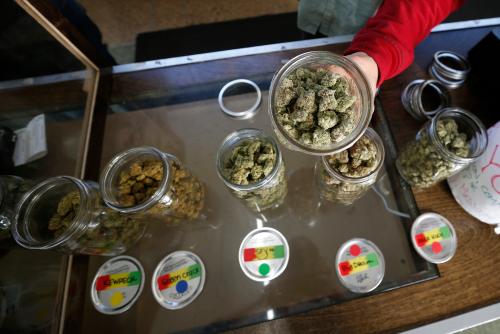This piece originally appeared in the Los Angeles Times on January 30, 2019.
Cannabis is now legal in a number of states, but the money it generates is still seen as tainted.
The reason for this is the clash between state laws legalizing recreational marijuana and federal laws that label it a controlled substance. As a result, some business owners operating legally under state laws have been fingered as potential money launderers, and many have been kicked out of the banking system altogether. Federal regulators need to remedy the situation.
Currently, very few banks and credit unions accept marijuana-related businesses as customers, even though they are legally allowed to, according to the U.S. Treasury’s Financial Crimes Enforcement Network. Treasury has provided guidance to banks and credit unions advising them that handling such business is legal. But the guidance doesn’t effectively address the core reason many banks won’t deal with customers in the marijuana trade: expensive and onerous paperwork required from the banks about such customers under anti-money-laundering regulations.
CEOs of cannabis companies have had their personal bank accounts closed, and their storefront employees have as well.
Federal regulations against money laundering require filing suspicious-activity reports on customers banks suspect are depositing revenue garnered from illegal activities. Filing these reports is expensive and can open up banks to potentially large fines and regulatory sanctions. Once a bank has identified a customer as suspicious, it has to continually file on both deposits and payments. This makes sense if the idea is to follow the money to uncover hidden criminal enterprises. But it makes no sense when applied to state-licensed marijuana businesses, which operate openly and are easily located on Google Maps.
Still, as marijuana has become legal in more places, the number of suspicious-activity reports filed by banks has mushroomed. About 3 million such reports were filed in 2017, more than double the 1.3 million filed in 2010. There’s no way of saying for sure how many of these additional 1.7 million suspicious transactions involve cannabis, since information contained in the filings is secret. But something is driving this spike. Today, one in five Americans live in a state with commercial recreational cannabis.
Banks that want to steer clear of the cannabis industry often adopt internal rules prohibiting accounts for customers they have reason to believe are engaged in the trade. Those rules, along with fear of violating federal regulations, have led to banks closing the accounts of people involved with marijuana, a process known as “de-risking.” Marijuana-related businesses such as dispensaries are at highest risk of being turned down by a bank or subject to federal reporting, but those in the next ring are also becoming targets.
CEOs of cannabis companies have had their personal bank accounts closed, and their storefront employees have as well. Even those not part of the cannabis industry but doing business with such firms are at risk. Witness the lawyer in California whose account was closed because he represented marijuana companies.
Nor are politicians immune. Last year, Wells Fargo closed the campaign account of a Democratic candidate for Florida agriculture commissioner because she received a campaign contribution from a cannabis firm (she won the election).
Banks will one day have to face the question of whether state and local governments, which receive tax revenue from cannabis, should be subject to reporting or de-banking. This year, for example, Colorado is expected to surpass $1 billion in total government revenue from marijuana since it began legalizing and taxing the industry in 2014.
If a state or local government’s account were deemed suspicious, reporting would entail not only the funds going into the account, but also money going out. Does this mean a bank would need to file suspicious-activity reports on teachers, police officers or municipal debt holders who were being paid by governments that collected taxes from marijuana-related businesses?
There are simple solutions. The Treasury Department, which has the regulatory pen, could simply exempt banks from reporting on state-licensed marijuana businesses. Another easy move would be to exempt state and local governments from any filing as a result of depositing tax revenue from this industry. Bank regulators who examine institutions for compliance should clarify the process for both serving marijuana firms and for dealing with existing customers who do business with those firms.
Yes, there are political risks to fixing the situation. But failure to act has created an absurd situation. Conservatives who dislike costly regulation and progressives who favor state-legalized cannabis ought to be able to agree and fix it.
The Brookings Institution is committed to quality, independence, and impact.
We are supported by a diverse array of funders. In line with our values and policies, each Brookings publication represents the sole views of its author(s).




Commentary
An easy fix could give the marijuana industry access to banking
January 31, 2019